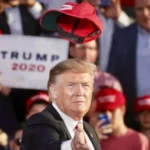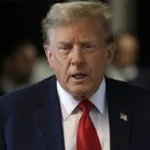Donald Trump’s legal team is gearing up for their final efforts to discredit Michael Cohen, the former lawyer and fixer who orchestrated the $130,000 hush-money payment to adult film star Stormy Daniels. As the criminal trial against the former president resumes on Monday, the defense aims to dismantle Cohen’s credibility, a key component of the prosecution’s case.
The defense has already made several attempts to undermine Cohen’s testimony. Last week, they had him affirm that the hush-money payment was part of a legitimate settlement agreement, countering the prosecution’s assertion that recording the payment as legal expenses was fraudulent.
Cohen has faced allegations of lying to suit his needs, including false statements to Congress about a Trump real estate deal in Moscow, misleading a federal judge in 2018, and allegedly lying to prosecutors about Trump’s involvement in the hush-money deal—an accusation Cohen has denied.
Cohen will return to the stand for additional cross-examination, marking his fourth and likely final day of testimony in the first criminal trial of a US president. Following Cohen’s testimony, the prosecution is expected to rest its case.
The question of whether Trump will testify remains uncertain. Although Trump has hinted at wanting to take the stand, his decision is not yet confirmed. If Trump chooses not to testify, closing arguments could occur on Tuesday, with jury deliberations potentially beginning on Thursday, as the court does not convene on Wednesdays.
Trump has pleaded not guilty to 34 counts of felony falsification of business records. Prosecutors must demonstrate that Trump authorized hush-money repayments, falsely labeled as “legal expenses” in the Trump Organization’s records, with the intent to commit a second crime.
The charges against Trump stem from efforts to suppress negative stories about alleged sexual encounters with Daniels and others, which could have adversely affected his campaign just weeks before the 2016 election. Cohen’s testimony is crucial, as he directly ties Trump to the hush-money deal. However, Cohen’s credibility is under intense scrutiny due to his past dishonesty and motivations.
Trump’s lead defense lawyer, Todd Blanche, suggested that Cohen’s motivation to lie in his testimony is rooted in a desire to see Trump imprisoned after the then-president abandoned him when federal prosecutors charged Cohen with felony tax evasion and false statements six years ago.
Blanche accused Cohen of lying about several aspects of the hush-money deal, including Cohen’s claims that he didn’t seek a White House job or a presidential pardon. Blanche pointed to private messages and other evidence contradicting Cohen’s statements.
Blanche also challenged Cohen’s testimony regarding a crucial phone call with Trump’s then-bodyguard, Keith Schiller, on October 24, 2016. Cohen claimed he informed Trump about the hush-money payment during the call. However, Blanche offered an alternative explanation, suggesting that the call was too brief—lasting only one minute and 30 seconds—for Cohen to have discussed the deal and that it was actually about prank calls from a teenager.
“You can admit that you lied,” Blanche asserted during cross-examination, raising his voice. “No sir, I can’t,” Cohen responded, standing by his testimony.










